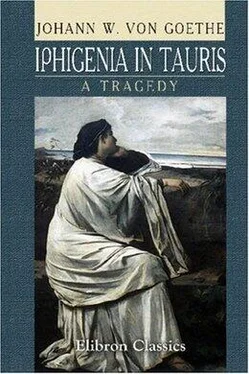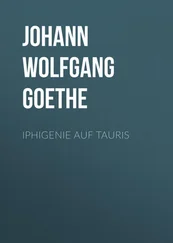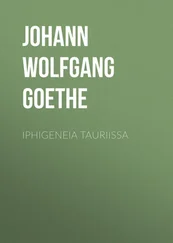ARKAS.
The gods are wont to save by human means.
IPHIGENIA.
By their appointment everything is done.
ARKAS.
Believe me, all doth now depend on thee.
The irritated temper of the king
Alone condemns these men to bitter death.
The soldiers from the cruel sacrifice
And bloody service long have been disused;
Nay, many, whom their adverse fortunes cast
In foreign regions, there themselves have felt
How godlike to the exil'd wanderer
The friendly countenance of man appears.
Do not deprive us of thy gentle aid!
With ease thou canst thy sacred task fulfil:
For nowhere doth benignity, which comes
In human form from heaven, so quickly gain
An empire o'er the heart, as where a race,
Gloomy and savage, full of life and power,
Without external guidance, and oppress'd
With vague forebodings, bear life's heavy load.
IPHIGENIA.
Shake not my spirit, which thou canst not bend
According to thy will.
ARKAS.
While there is time
Nor labour nor persuasion shall be spar'd.
IPHIGENIA.
Thy labour but occasions pain to me;
Both are in vain; therefore, I pray, depart.
ARKAS.
I summon pain to aid me. 'tis a friend
Who counsels wisely.
IPHIGENIA.
Though it shakes my soul,
It doth not banish thence my strong repugnance.
ARKAS.
Can then a gentle soul repugnance feel
For benefits bestow'd by one so noble?
IPHIGENIA.
Yes, when the donor, for those benefits,
Instead of gratitude, demands myself.
ARKAS.
Who no affection feels doth never want
Excuses. To the king I'll now relate
All that has happen'd. Oh, that in thy soul
Thou wouldst revolve his noble conduct, priestess,
Since thy arrival to the present day!
alone
.
These words at an unseasonable hour
Produce a strong revulsion in my breast;
I am alarm'd!—For as the rushing tide
In rapid currents eddies o'er the rocks
Which lie among the sand upon the shore;
E'en so a stream of joy o'erwhelm'd my soul.
I grasp'd what had appear'd impossible.
It was as though another gentle cloud
Around me lay, to raise me from the earth,
And rock my spirit in the same sweet sleep
Which the kind goddess shed around my brow,
What time her circling arm from danger snatch'd me.
My brother forcibly engross'd my heart;
I listen'd only to his friend's advice;
My soul rush'd eagerly to rescue them,
And as the mariner with joy surveys
The less'ning breakers of a desert isle,
So Tauris lay behind me. But the voice
Of faithful Arkas wakes me from my dream,
Reminding me that those whom I forsake
Are also men. Deceit doth now become
Doubly detested. O my soul, be still!
Beginn'st thou now to tremble and to doubt?
Thy lonely shelter on the firm–set earth
Must thou abandon? and, embark'd once more,
At random drift upon tumultuous waves,
A stranger to thyself and to the world?
SCENE IV.
IPHIGENIA. PYLADES.
PYLADES.
Where is she? that my words with speed may tell
The joyful tidings of our near escape!
IPHIGENIA.
Oppress'd with gloomy care, I much require
The certain comfort thou dost promise me.
PYLADES.
Thy brother is restor'd! The rocky paths
Of this unconsecrated shore we trod
In friendly converse, while behind us lay,
Unmark'd by us, the consecrated grove;
And ever with increasing glory shone
The fire of youth around his noble brow.
Courage and hope his glowing eye inspir'd;
And his free heart exulted with the joy
Of saving thee, his sister, and his friend.
IPHIGENIA.
The gods shower blessings on thee, Pylades!
And from those lips which breathe such welcome news,
Be the sad note of anguish never heard!
PYLADES.
I bring yet more,—for Fortune, like a prince,
Comes not alone, but well accompanied.
Our friends and comrades we have also found.
Within a bay they had conceal'd the ship,
And mournful sat expectant. They beheld
Thy brother, and a joyous shout uprais'd,
Imploring him to haste the parting hour.
Each hand impatient long'd to grasp the oar,
While from the shore a gently murmuring breeze,
Perceiv'd by all, unfurl'd its wing auspicious.
Let us then hasten; guide me to the fane,
That I may tread the sanctuary, and seize
With sacred awe the object of our hopes.
I can unaided on my shoulder bear Diana's image: how I long to feel
The precious burden!
[ While speaking the last words, he approaches the Temple, without perceiving that he is not followed by Iphigenia: at length he turns round. ]
Why thus ling'ring stand.
Why art thou silent? wherefore thus confus'd?
Doth some new obstacle oppose our bliss?
Inform me, hast thou to the king announc'd
The prudent message we agreed upon?
IPHIGENIA.
I have, dear Pylades; yet wilt thou chide.
Thy very aspect is a mute reproach.
The royal messenger arriv'd, and I,
According to thy counsel, fram'd my speech.
He seem'd surpris'd, and urgently besought,
That to the monarch I should first announce
The rite unusual, and attend his will.
I now await the messenger's return.
PYLADES.
Danger again doth hover o'er our heads!
O priestess, why neglect to shroud thyself
Within the veil of sacerdotal rites?
IPHIGENIA.
I never have employ'd them as a veil.
PYLADES.
Pure soul! thy scruples will destroy alike
Thyself and us. Why did I not foresee
Such an emergency, and tutor thee
This counsel also wisely to elude?
IPHIGENIA.
Chide only me, for mine alone the blame.
Yet other answer could I not return
To him, who strongly and with reason urg'd
What my own heart acknowledg'd to be right.
PYLADES.
The danger thickens; but let us be firm,
Nor with incautious haste betray ourselves;
Calmly await the messenger's return,
And then stand fast, whatever his reply:
For the appointment of such sacred rites
Doth to the priestess, not the king belong.
Should he demand the stranger to behold
Who is by madness heavily oppress'd,
Evasively pretend, that in the fane,
Securely guarded, thou retain'st us both.
Thus you secure us time to fly with speed,
Bearing the sacred treasure from this race,
Unworthy its possession. Phoebus sends
Auspicious omens, and fulfils his word,
Ere we the first conditions have perform'd.
Free is Orestes, from the curse absolv'd!
Oh, with the freed one, to the rocky isle
Where dwells the god, waft us, propitious gales!
Thence to Mycene, that she may revive;
That from the ashes of the extinguish'd hearth,
The household gods may joyously arise,
And beauteous fire illumine their abode!
Thy hand from golden censers first shall strew
The fragrant incense. O'er that threshold thou
Shalt life and blessing once again dispense,
The curse atone, and all thy kindred grace
With the fresh bloom of renovated life.
IPHIGENIA.
As doth the flower revolve to meet the sun,
Once more my spirit to sweet comfort turns,
Struck by thy words' invigorating ray.
How dear the counsel of a present friend,
Lacking whose godlike power, the lonely one
In silence droops! for, lock'd within his breast,
Slowly are ripen'd purpose and resolve,
Which friendship's genial warmth had soon matur'd.
Читать дальше












